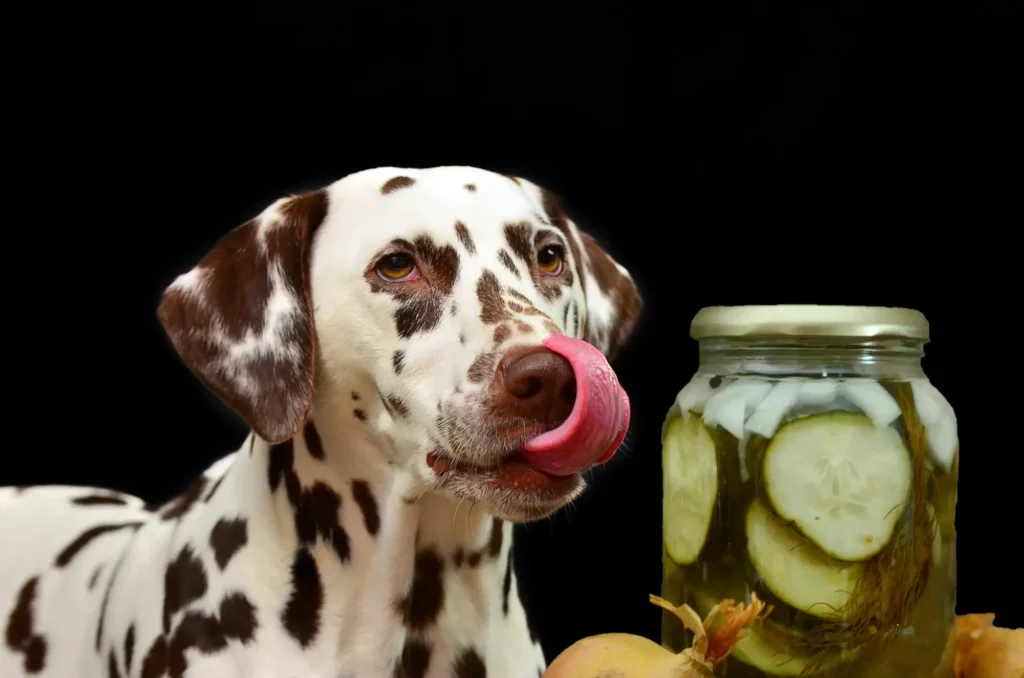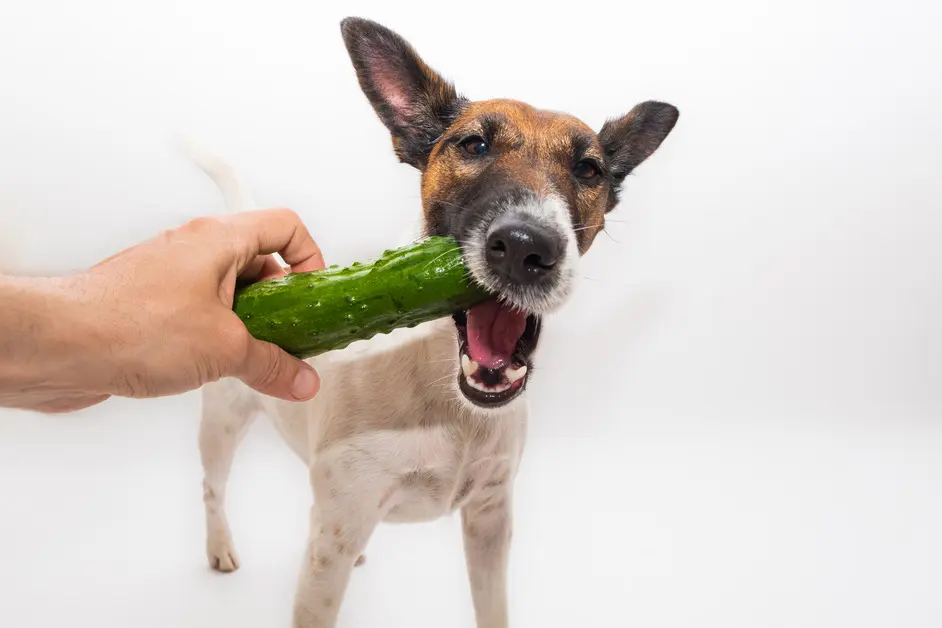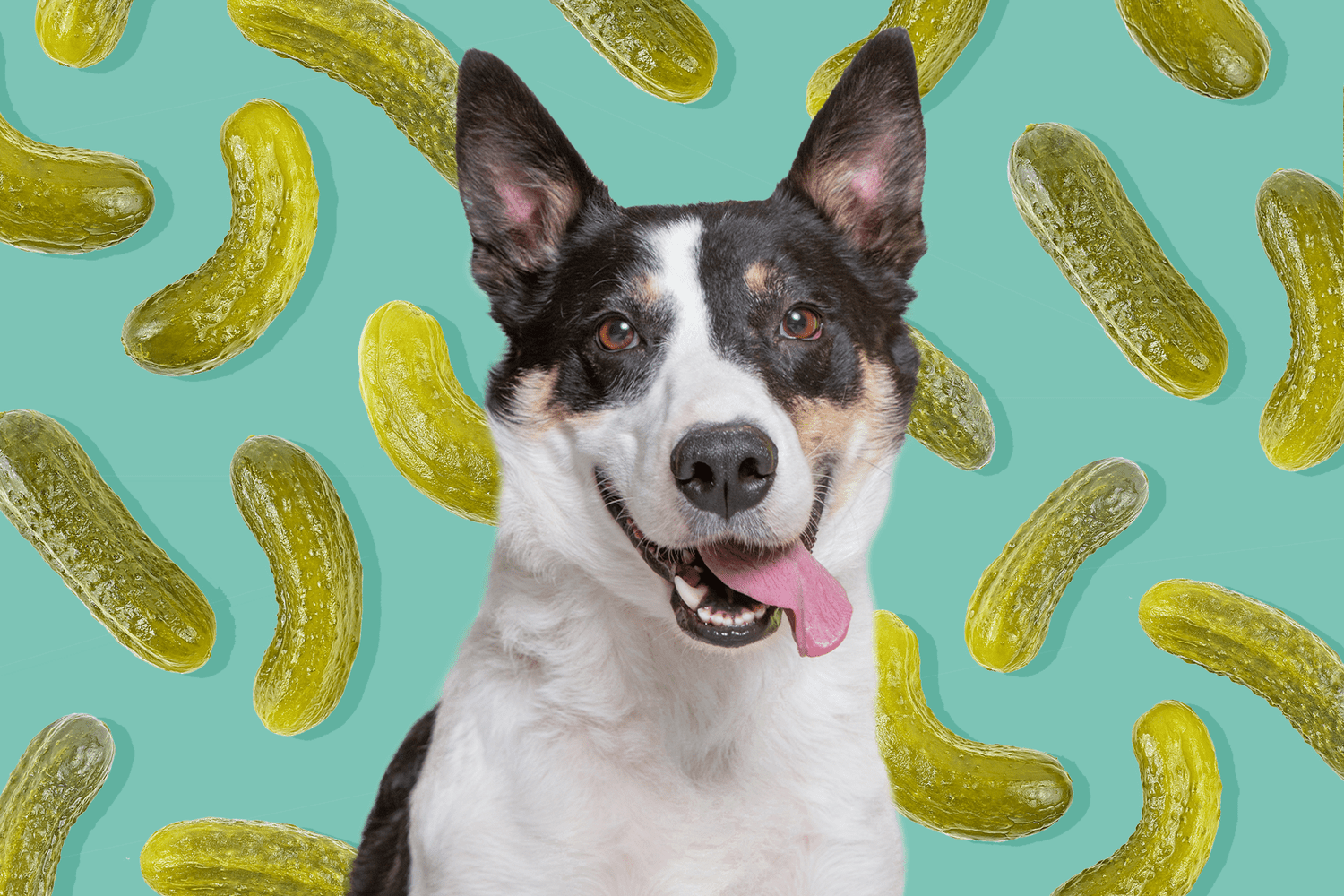Can Dogs Eat Pickles, as a pet owner, ensuring your dog’s health and well-being is a top priority. With the rise of pet owners sharing their meals and snacks with their furry companions, many are left wondering: can dogs eat pickles? In this comprehensive guide, we’ll explore the safety, benefits, and potential risks of feeding pickles to dogs, providing you with all the information you need to make an informed decision.
Understanding Pickles: What Are They?
Can Dogs Eat Pickles, pickles are cucumbers that have been preserved in brine or vinegar, often seasoned with various spices. This process not only enhances the flavor but also extends the shelf life of cucumbers. Common varieties of pickles include dill pickles, sweet pickles, and bread-and-butter pickles. While they are a popular snack for humans, it’s essential to consider whether these tangy treats are suitable for your canine companion.
Can Dogs Eat Pickles?
The simple answer is: yes, dogs can eat pickles in moderation. However, there are several factors to consider before introducing this food into your dog’s diet.
Nutritional Content of Pickles
Can Dogs Eat Pickles, pickles are primarily composed of cucumbers, which are low in calories and high in water content. They can provide some hydration for your dog. However, the pickling process involves adding salt and vinegar, which can alter the nutritional value and safety of pickles for dogs.
Are Pickles Safe for Dogs?
While pickles are not toxic to dogs, they do contain ingredients that may not be suitable for all dogs. Here are a few things to keep in mind:
- Salt Content: Can Dogs Eat Pickles, most pickles are high in sodium due to the brine used in the pickling process. Excessive salt can lead to dehydration and other health issues in dogs, particularly in those with existing health conditions like kidney disease or heart problems.
- Vinegar: The acidity of vinegar can be harsh on your dog’s stomach, potentially causing digestive upset. Some dogs may be more sensitive to acidic foods than others.
- Spices and Additives: Can Dogs Eat Pickles, many pickles contain spices, garlic, or onion, which are harmful to dogs. Always check the ingredients before offering any pickle to your pet.
Types of Pickles and Their Safety for Dogs
Not all pickles are created equal. Here are some common types and their suitability for dogs:
- Dill Pickles: These are often the most common type of pickle and are generally safe in small amounts, provided they do not contain garlic or onion.
- Sweet Pickles: These are typically high in sugar, which is not ideal for dogs. Consuming too much sugar can lead to obesity and dental issues.
- Bread-and-Butter Pickles: These pickles contain added sugar and spices that may not be safe for dogs. It’s best to avoid these entirely.
- Homemade Pickles: Can Dogs Eat Pickles, if you’re making pickles at home, you can control the ingredients. Opt for low-sodium and vinegar-free recipes to make them safer for your dog.

How to Introduce Pickles to Your Dog’s Diet
If you’ve decided to give your dog a pickle, it’s essential to introduce it gradually and in moderation. Here’s how to do it safely:
- Start Small: Offer a tiny piece of pickle to see how your dog reacts. Monitor for any signs of digestive upset or allergic reactions.
- Observe Your Dog: Can Dogs Eat Pickles, after feeding the pickle, watch for any unusual behavior. Symptoms such as vomiting, diarrhea, or lethargy may indicate that the pickle did not agree with your dog.
- Frequency: Pickles should only be an occasional treat, not a regular part of your dog’s diet. Limit it to once every few weeks.
Potential Health Benefits of Pickles for Dogs
While pickles should be fed in moderation, there are a few potential benefits that come from cucumbers and pickles:
- Hydration: Pickles can provide some hydration due to their high water content, particularly if your dog is not drinking enough water.
- Low Calorie: If your dog is overweight, pickles can serve as a low-calorie treat compared to other snacks.
- Digestive Health: Some dogs enjoy the crunchiness of pickles, which can promote chewing and may help with dental health.
Risks and Considerations
Despite the potential benefits, there are risks associated with feeding pickles to dogs. Here are some important considerations:
1. Sodium Poisoning
High sodium levels can lead to sodium ion poisoning in dogs. Symptoms include excessive thirst, urination, vomiting, and in severe cases, seizures or death. Always check the sodium content of pickles before feeding them to your dog.
2. Allergic Reactions
Can Dogs Eat Pickles, as with any new food, some dogs may have allergic reactions to pickles. Watch for signs such as itching, swelling, or gastrointestinal distress.
3. Behavioral Changes
Some dogs may experience changes in behavior after consuming pickles, such as increased thirst or hyperactivity. Monitor your dog’s behavior after introducing pickles to their diet.
What to Do If Your Dog Eats Pickles
If your dog accidentally consumes a large amount of pickles or shows signs of distress, it’s important to act quickly:
- Monitor Symptoms: Keep an eye on your dog for any signs of distress or illness.
- Contact Your Veterinarian: Can Dogs Eat Pickles, if you notice any concerning symptoms, reach out to your vet for advice. They may recommend bringing your dog in for an examination.
- Hydration: Ensure your dog has access to fresh water to help dilute any excess salt in their system.

Alternatives to Pickles for Dogs
If you’re looking for healthy snack alternatives for your dog, consider these options:
- Carrots: Crunchy and low in calories, carrots are a great treat that many dogs love.
- Cucumbers: Fresh cucumbers (without salt or dressing) can be a safe and hydrating snack for dogs.
- Green Beans: These are low in calories and high in fiber, making them a healthy option.
- Sweet Potatoes: Cooked and cut into small pieces, sweet potatoes can provide a nutritious and tasty treat.
Frequently Asked Questions
Can Puppies Eat Pickles?
Puppies have sensitive stomachs and should avoid pickles altogether until they are older. Introducing new foods should be done cautiously in young dogs.
How Many Pickles Can a Dog Eat?
Can Dogs Eat Pickles, limit it to one small piece occasionally. Excessive consumption can lead to health issues.
Are Pickles Harmful to Dogs?
Pickles are not inherently harmful, but the high sodium and potential spices can pose risks. Always check the ingredients and feed in moderation.
What Should I Do If My Dog Eats a Whole Jar of Pickles?
If your dog consumes a large quantity, monitor for any symptoms of distress and contact your veterinarian immediately.
Can Dogs Eat Dill Pickles Safely?
Dill pickles can be safe in small amounts, provided they do not contain harmful ingredients like garlic or onion. Always check the label.
Conclusion
In conclusion, the question of whether dogs can eat pickles is nuanced. While dogs can eat pickles in moderation, it’s essential to consider the type of pickle and its ingredients. Always prioritize your dog’s health and well-being by introducing any new food slowly and monitoring for adverse reactions.
Can Dogs Eat Pickles, if you have any doubts or concerns, it’s always best to consult with your veterinarian before introducing pickles or any human food into your dog’s diet. By being informed and cautious, you can ensure your furry friend enjoys a safe and healthy diet.
Also read: The Ultimate Guide to Dog Car Seats





